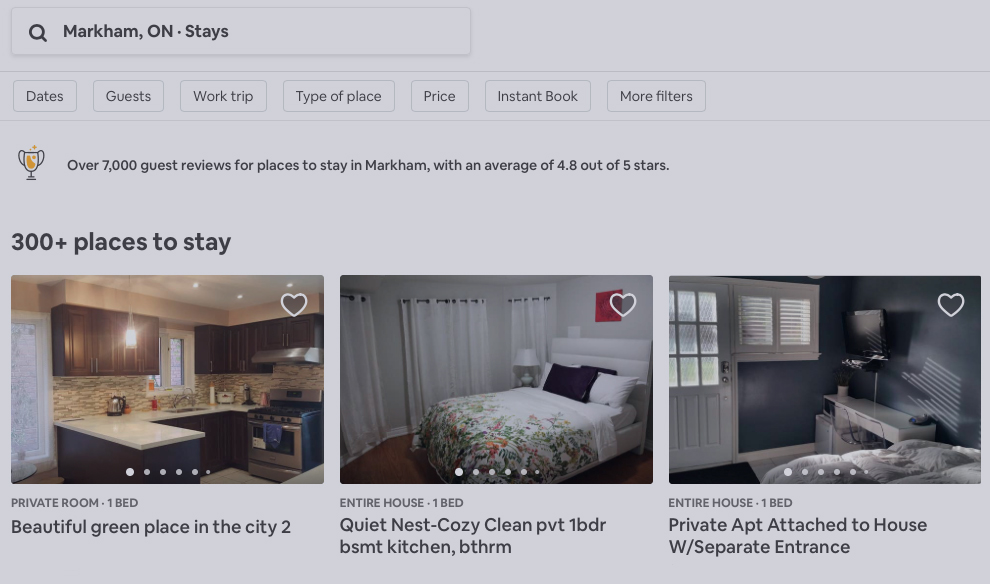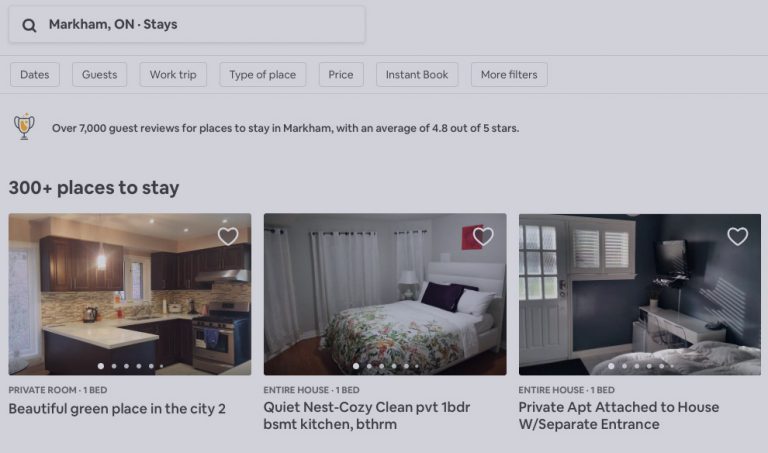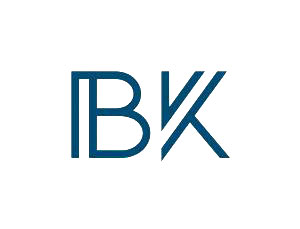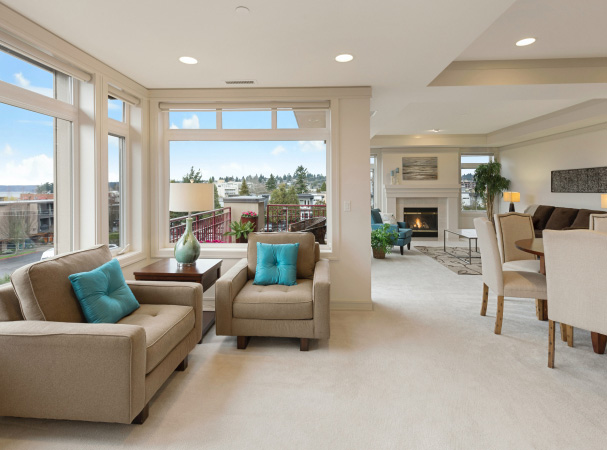Is Airbnb Affecting the Real Estate Market?
Posted By: Rachel Kavanagh

Is Airbnb Affecting the Real Estate Market? – According to a groundbreaking study by McGill University, more than 31,000 homes across the country were rented out so often on Airbnb in 2018 that they were likely removed from the long-term rental supply. Those 31,000 homes are equal to about 1.5% of residences across the country that have been built for the rental market.
In the report, researchers found that in 2018, the platform had a daily average of 128,000 active listings in Canada, which includes everything from a basement suite to a lakefront cottage, an increase of 25% from 2017. The additional listings resulted in a 40% increase in revenue for the hosts.
The majority of active Airbnb listings and revenue were highly concentrated in four municipalities: Whistler, BC; The Blue Mountains and Prince Edward County in Ontario and Mont-Tremblant, Que. These four rural areas accounted for $157.7 million out of the $570.5 million earned by rural areas across the country in 2018.
There does not seem to be an issue with the individual person looking to make a little bit more money by listing their cottage for rent. It is the commercial operators. Nearly half of all Canadian Airbnb revenue in 2018 was generated by commercial operators who manage multiple listings. Fifteen operators managed at least 100 active listings a piece in the past year and nearly 60 hosts earned more than $1 million in 2018.
Canadian cities really stand out when you look around the world, for having their short-term rental market dominated by commercial operators and Montreal is the worst in the world.
As short-term rental platforms continue to grow and policymakers have started to respond.
In 2016, Quebec became the first major Canadian jurisdiction to regulate the short-term rental industry, requiring some hosts to obtain permits. Vancouver’s rules went into effect last year and only allow short-term rentals in a host’s principal residence. The City of Toronto passed bylaws in 2017 and 2018 that would make an Airbnb operator get a licence from the city, restrict the number of nights a listing can rent (180 days), restrict all listings to the operator’s principal residence (no second, third or fourth properties for rent) and ban renting out basement properties.
Not only have the policymakers begun to regulate the short-term rental market. The mortgage industry has started to take notice.
For homeowners, a property capable of generating some rental income can be an enticing feature when it comes time to list for sale. But as more people have turned to services such as Airbnb to generate that income, they may not be aware that there are potential downsides to that association for all parties involved.
There are many lenders such as MCAP, First National and several banks who reject mortgaging any rentals where there is Airbnb income.
When a typical residential property with rental income attached is purchased with a mortgage, most lenders will include a special contract in the loan referred to as an “assignment of rents” agreement. This offers the bank some protection in the event that the mortgage borrower stops making payment. If this should occur, the rent being paid by the tenant will then be forwarded directly to the bank.
Those agreements often include requirements to notify the bank if anything about the rental stream changes, such as a tenant leaving or if space is re-occupied by the landlord. Turning a long-term rental into an Airbnb would likely violate those conditions because there is no longer guaranteed rent coming in.
Perhaps this helps explain that while there are thousands of rooms for rent on Airbnb in the Greater Toronto Area, and there are fewer than a dozen active listings (out of close to 6,000) on the Toronto Real Estate Board’s multiple listing service that even mention Airbnb.
The popularity of short-term rentals has soared, the effect on rental supply in Canada’s cities, towns and rural areas has grown. This increased popularity has had a direct impact on the rental market.
In Vancouver, Toronto and Montreal, 40% of the roughly 31,000 homes that were frequently rented last year were “lost” housing units (no longer intended for long-term rental). Hosts of those units brought in $374 million, up 30% from 2017.
The report outlines that, “the more Airbnb activity you see in a city, the higher housing prices and rents are going to get.”
“There is no question that Canadian cities are now past that point.”
Currently, in the City of Markham and the Town of Stouffville, there are more than 300+ places to stay on Airbnb.
In Toronto, vacancy rates for purpose-built apartments were 1.1% according to the CMHC. Toronto planners estimate the city would need 5,000 new rental units to bring its vacancy rate, which currently sits at 1.1% to 3%. Over the past 5 years, Toronto has added 18x more condominium units (80,000) than purpose-built rental units (4,500), according to a city report from January.
Airbnb and similar platforms are among several factors, including a lack of rental construction and high barriers to home ownership, that have affected rental markets. Housing advocates say not enough rental housing is being built in Canada’s largest cities to accommodate population growth.
“There are people being evicted from their apartment buildings to convert those units into Airbnb’s” indicated Prof. David Wachsmuth.
Short-term rental companies, like Airbnb, have enjoyed a period of time where policymakers didn’t really pay attention. That time is now over.
* Is Airbnb Affecting the Real Estate Market? – written by Benczik Team Realty
For more information on your home, visit our website and get a free home evaluation to ensure you get the best seller’s service! With experience around Markham, Stouffville, Unionville, and all of York Region, Benczik Team Realty works to serve you in the best way possible! Act now, and don’t miss out on this ever-growing market.





